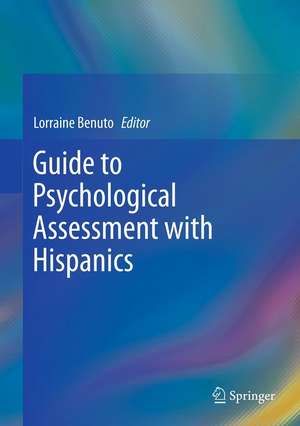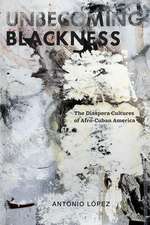Guide to Psychological Assessment with Hispanics
Editat de Lorraine T. Benutoen Limba Engleză Hardback – 19 sep 2012
| Toate formatele și edițiile | Preț | Express |
|---|---|---|
| Paperback (1) | 950.27 lei 43-57 zile | |
| Springer Us – 23 aug 2016 | 950.27 lei 43-57 zile | |
| Hardback (1) | 1255.93 lei 43-57 zile | |
| Springer Us – 19 sep 2012 | 1255.93 lei 43-57 zile |
Preț: 1255.93 lei
Preț vechi: 1322.02 lei
-5% Nou
Puncte Express: 1884
Preț estimativ în valută:
240.35€ • 250.40$ • 199.84£
240.35€ • 250.40$ • 199.84£
Carte tipărită la comandă
Livrare economică 10-24 februarie 25
Preluare comenzi: 021 569.72.76
Specificații
ISBN-13: 9781461444114
ISBN-10: 146144411X
Pagini: 440
Ilustrații: XV, 422 p.
Dimensiuni: 178 x 254 x 29 mm
Greutate: 9.66 kg
Ediția:2013
Editura: Springer Us
Colecția Springer
Locul publicării:New York, NY, United States
ISBN-10: 146144411X
Pagini: 440
Ilustrații: XV, 422 p.
Dimensiuni: 178 x 254 x 29 mm
Greutate: 9.66 kg
Ediția:2013
Editura: Springer Us
Colecția Springer
Locul publicării:New York, NY, United States
Public țintă
Professional/practitionerCuprins
1. Guide to Psychological Assessment with Hispanics: An Introduction.- 2. Bilingualism and its Impact on Psychological Assessment.- 3. The Assessment Interview: A review of Structured and Semi-Structured Clinical Interviews available for use among Hispanic Clients.- 4. Using Projective Tests with Hispanic Clients.- 5. Assessing Personality using Self-Report Measures with Hispanic Clients.- 6. IQ Testing and the Hispanic Client.- 7. Assessing Effort & Malingering with the Hispanic Client.- 8. Assessing Mood Disorders and Suicidality in Hispanics.- 9. Special Considerations when Assessing the Hispanic Adolescent: Examining Suicide Risk.- 10. Assessing Suicidality with the Hispanic Adult.- 11. Assessment of Anxiety with Hispanics.- 12. Assessing Substance-Related Disorders in Hispanic Clients.- 13. Assessing Sexual Dysfunction in Hispanic Clients.- 14. Assessing Eating Pathology in Hispanic Americans.- 15. Assessing for Personality Disorders in the Hispanic Client.- 16. Assessment of Dementia in the Hispanic Client: A Neuropsychological Perspective.- 17. Assessing Psychosis in Hispanics.- 18. Assessing Sleep Disorders in the Hispanic Patient.- 19. Assessing Somatoform Disorders with the Hispanic Client.- 20. Assessing developmental learning and communication disorders in Hispanic children: a neuropsychological perspective.- 21. School-based Assessment with Latina/o Children & Adolescents.- 22. Neuropsychological Assessment with Hispanic Clients.- 23. Assessing Risk, Recidivism, and Dangerousness in Hispanics.- 24. Forensic Assessment with the Hispanic Client.
Notă biografică
Lorraine T. Benuto received her doctoral degree in psychology from the University of Nevada, Las Vegas. She is a licensed clinical psychologist and she currently works at the University of Nevada, Reno as a clinical psychologist where she provides treatment to victims of sexual assault, sexual abuse, and child physical abuse. Dr. Benuto is also the associate director of the Nevada Caregiver Support Center where she works with individuals who have dementia and their families. Finally, Dr. Benuto chairs doctoral dissertations at Northcentral University. Dr. Benuto completed her APA-accredited internship at the VA in San Juan, Puerto Rico where she delivered psychological services to a culturally diverse clientele presenting with depression, anxiety, and dementia. Dr. Benuto has extensive experience delivering evidence-based treatments and conducting psychological assessments with the Latino population. She has delivered professional presentations at state, national, and international conferences on topics related to cultural competence and is co-editing Handbook of Adolescent Health Psychology, Guidelines to Psychological Assessment with African Americans, and Guidelines to Psychological Assessment with Asian Americans for Springer.
Textul de pe ultima copertă
A breakthrough moment in psychological assessment was the realization that one size does not fit all. Few populations prove this true as much as America’s largest ethnic minority: Hispanics, whose lives reflect a wide spectrum of cultural, language, and social factors. Traditionally, assessment has paid scant attention to such variables, but now clinicians are increasingly aware of linguistic and acculturation issues that can influence how psychological problems present—and that skewed test results can lead to misdiagnosis, inappropriate and ineffective treatment, and potentially devastating consequences.
The Guide to Psychological Assessment with Hispanics meets this evolving challenge by both outlining necessary cultural considerations and recommending specific measures for conducting assessment with Latino clients. This comprehensive resource describes salient test instruments in every major diagnostic area, and reviews current research on their use. Discussion covers the strengths and limitations of every measure featured, which span the range of assessment domains and specialties, including:
As guidelines for therapy with Latino clients are coming into their own, culturally relevant assessment is of critical importance. Its depth of practical detail makes the Guide to Psychological Assessment with Hispanics an essential reference for clinical psychologists, clinical social workers, and neuropsychologists.
The Guide to Psychological Assessment with Hispanics meets this evolving challenge by both outlining necessary cultural considerations and recommending specific measures for conducting assessment with Latino clients. This comprehensive resource describes salient test instruments in every major diagnostic area, and reviews current research on their use. Discussion covers the strengths and limitations of every measure featured, which span the range of assessment domains and specialties, including:
- Intelligence.
- Personality.
- Eating, sleeping, sexual, and substance abuse disorders.
- Mood disorders and suicide risk.
- Child-specific and school-based measures.
- Neuropsychology, forensics, dementia, psychosis, malingering, and more.
As guidelines for therapy with Latino clients are coming into their own, culturally relevant assessment is of critical importance. Its depth of practical detail makes the Guide to Psychological Assessment with Hispanics an essential reference for clinical psychologists, clinical social workers, and neuropsychologists.
Caracteristici
One of few books to address the psychological assessment of Hispanic clients Includes general assessment issues and up-to-date research on specific psychological tests A how-to guide for clinicians, researchers, and instructors working with Hispanic populations














